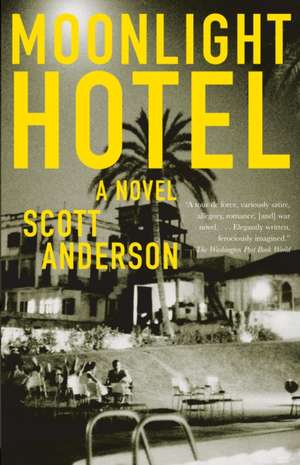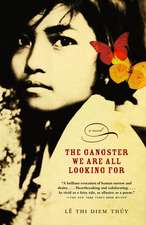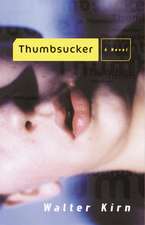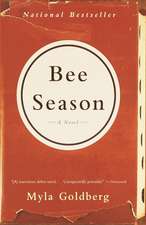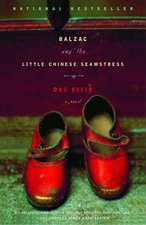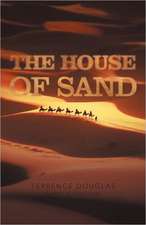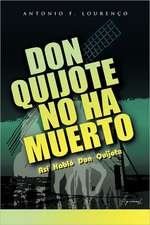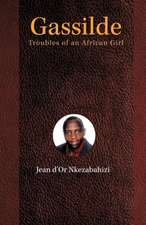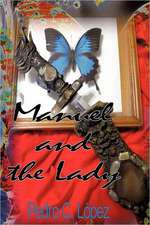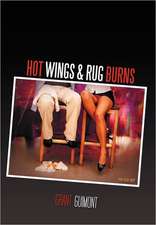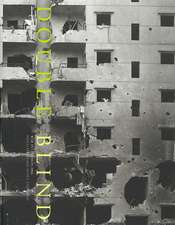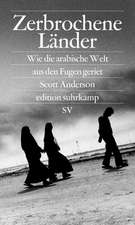Moonlight Hotel
Autor Scott Andersonen Limba Engleză Paperback – 31 iul 2007
Preț: 110.36 lei
Nou
Puncte Express: 166
Preț estimativ în valută:
21.12€ • 22.21$ • 17.45£
21.12€ • 22.21$ • 17.45£
Carte disponibilă
Livrare economică 27 martie-10 aprilie
Preluare comenzi: 021 569.72.76
Specificații
ISBN-13: 9781400095636
ISBN-10: 1400095638
Pagini: 419
Dimensiuni: 135 x 202 x 23 mm
Greutate: 0.31 kg
Editura: Anchor Books
ISBN-10: 1400095638
Pagini: 419
Dimensiuni: 135 x 202 x 23 mm
Greutate: 0.31 kg
Editura: Anchor Books
Notă biografică
Scott Anderson is a veteran war correspondent, a contributing writer for the New York Times Magazine, whose work also appears in Vanity Fair, Esquire, Harper's, Outside and many other publications. Over the years he has reported from Beirut, Northern Ireland, Chechnya, Israel, Sudan, Sarajevo, El Salvador and many other war-torn countries. He is the author of the critically-acclaimed novel Triage, as well as the nonfiction book The Man Who Tried to Save the World: The Life and Mysterious Disappearance of Fred Cuny and, with his brother Jon Lee Anderson War Zones. A graduate of the Iowa Writer's School, Anderson lives in upstate New York with his wife, the filmmaker Nanette Burstein.
Extras
One
She was leaning on the balcony railing, staring into the night, and David saw how her bare arms shone white, like marble or bone, from the lights of the house. She turned to look at him over her shoulder, tossing her blond hair as she did so. She smiled.
"You must have the best view in Kutar," she said.
David set their drinks on the railing, leaned like her, gazed out at what she saw. "One of them, I guess," he said.
They were on the back balcony of the house. The land fell away abruptly at that point on the ridgeline, giving the illusion at night that one was perched on the edge of a steep cliff. The airport and northern suburbs were below them, and then the desert began, a great darkness broken only by an occasional vehicle coming over the national highway and a few bright lights in the far distance. During his first weeks in Kutar, David had thought those lights were of isolated homes, homes he could never make out during the day, until his telescope arrived and he discovered they were stars low on the horizon. He looked to her and told her this.
She was very pretty in a wholesome, middle-America kind of way: striking eyes somewhere between blue and gray, a pleasant mouth, the emerald-green sheath dress suited her pale skin. He had forgotten her name. Julia, possibly, or maybe Janine.
She took a perfunctory sip from her drink, glanced at her wristwatch. "I should probably get going. Corinne will get worried."
David knew this was the time for him to say something--really, most anything would do. Instead he looked back out at the desert.
An upland breeze brought sounds from the northern suburbs: car horns, the rhythmic clang of metal, the whine of a truck laboring over Gowarshad Pass. From somewhere down the ridge came the baying of a wolf. David had heard the coastal range was home to great packs of wolves--the small, tan-colored sort one found in this part of the world--but he had yet to see one personally.
It was her green dress that he had first noticed at the party; even now, in what passed for early autumn in Kutar, most foreigners wore shades of white on account of the heat. Corinne, the wife of the political attaché, had waved David over and introduced her cousin, just in from Chicago for a visit, with a sly expression. Janine? Perhaps it was Jennifer.
At the balcony, he pointed into the dark, off to the east. "The sun comes up right over there. At first the desert is pink, then orange. Then it turns to gold." He lowered his arm, turned to her. "You should stay and watch the sunrise."
He saw the way her hand tightened on the railing, she gave a nervous little laugh. "I don't know," she said. "What would Corinne think?"
David smiled, as much to himself as to her. Corinne knew exactly what to think. Corinne would be far more surprised if her cousin from Chicago actually made the journey back down the mountain tonight. He didn't say this, though.
"You can call her," he said, "tell her you want to see the sunrise."
She reached for her glass again, but stopped, her lips quivering in an uncertain way. He leaned in to kiss her lightly on the jaw.
"You should stay," he whispered.
He kissed her again, a bit lower this time, on her throat, and he felt her sharp intake of breath, her tensing. She smelled of gardenia and rose and something astringent, and she tilted her head back to make room for him.
By the bed, he watched her undress, felt a tug of something almost like sadness at the careful way she removed the green dress and draped it over a chairback.
Afterward, with her sleeping beside him, David gazed up at his bedroom ceiling and listened. There were the usual sounds of the night: the low thrum of the city, the odd creaks of the house; the wolf was quiet now. He felt her breath, hot and regular, on his neck.
He smiled in the dark, struck by the incongruous thought that her breaths on his throat were meant to serve a purpose, as if he were some inflatable object that needed air. With this thought, he considered kissing her--the top of her head was just an inch from his mouth, her hair brushed his lips--but he didn't want to wake her. Instead, after a time he moved out of her embrace, the warm breath on his throat was gone, because what had started out as a humorous image had become a bit unsettling, and he silently rose from the bed and went back outside. He looked to the east, as if for the first traces of dawn, even though he knew this was still a long way off.
The Monday morning staff meeting began at 10:30. David arrived a bit early, as was his habit, in order to claim a seat facing the windows and the embassy's inner courtyard. Though he couldn't see the courtyard garden from that vantage point--the conference room was on the third floor--some of the upper branches of the trees were visible, and he liked having them to gaze at when the meetings went long.
The others began filing in shortly after, singly or in pairs, and David said a few words of greeting to each. To his surprise, Bill Myerson sat directly across from him. David couldn't recall him ever sitting there before, and he wondered if it signified something. He nodded at Bill, then opened one of his file folders and pretended to scan its contents.
Ambassador Draper strode in precisely on time and made for his chair at the head of the table. Flipping to a blank page in his notebook, he took a silver pen from his shirt pocket, looked along the table with a knowing smile.
"Well," he said, "I just read over the NSA's situation report." He paused for effect. "No mention of us again."
There were polite chuckles at the ambassador's favorite--and at this point, somewhat tired--opening joke. Every Sunday, the National Security Agency cabled a classified report to all overseas missions listing any potential crises--military unrest, labor strikes, the failing health of a head of state--that might be cause for concern somewhere in the world that week. Over the course of a year, a particularly troubled country might garner dozens of such citations, but this was not the case with Kutar; before his own posting there, David had checked the NSA index and discovered the kingdom hadn't even been mentioned in nearly a decade.
"So let's do it," John Draper said, and turned to the man on his immediate right, the agricultural, commercial, and economic attaché, Lee Warren.
Because the American mission to Kutar was so small--nine officials, a support staff of some two dozen, the eight Marine Guards--all the traditional diplomatic portfolios were handled by a mere four attaches. This rarely caused problems. In Lee Warren's case, for example, Kutar had virtually no external commerce to speak of, its role in the global economy was largely theoretical, and for the attaches the consolidation held the benefit of making them eligible for a wider range of postings in the future.
As usual, Lee spoke for only a few minutes, and then it was the turn of Cheryl Thompson, the consular officer. Cheryl reported that her office had received 112 new visa applications during the previous week, but had processed 163--9 approvals, 154 rejections--as it tried to pare down the backlog. This brought an approving nod from the ambassador.
"Excellent," he said. "At this rate, we should be pretty well caught up by Christmas."
"I should think so," Cheryl replied.
It was, in fact, Kutar's very insignificance that had made Ambassador Draper's arrival six months earlier a bit puzzling. Not yet forty-five, his rise through the Foreign Service up to that point had been steady and swift, so there was considerable debate among the American legation as to why he had ended up there. Some speculated he was being groomed for a more sensitive post in the region, and thus "paying his dues," but at least as many suspected he had made an enemy of someone important at State and was suffering retribution. For his part, John Draper never let on that he was anything but thrilled to be in Kutar--which, of course, was itself the sign of a good diplomat.
In any event, David had taken a quick liking to Draper, as had most of the staff. Handsome, with the lanky frame of a former athlete, the ambassador exuded an energy and optimism that was refreshing. With his attractive wife, Susan, and their three polite children, the Drapers seemed the very essence of a diplomatic family--charming, earnest, easy with all kinds of people--the sort that could be relied upon to cast the United States in a positive light abroad. And even if the vigor he brought to the post seemed a tad excessive--the previous ambassador had found once-a-month staff meetings more than sufficient--David saw its benefit as a guard against the torpor of the place.
"And the king thinks he'll get everyone on board with it?" John Draper was following up on some issue raised by Harold Derwinski, the political attaché, the details of which David had missed.
"I'd say it's still in the talking phase," Harold replied. "There's liable to be some grumbling from the traditionalists, but it's got a lot of support with the technocrats."
"Good," the ambassador said, "let's keep on top of that."
As the meeting wore on, David looked to the tree branches beyond Bill Myerson's head. What passed for winter in Kutar--a misting rain, an ocean-borne wind--wouldn't start for at least another three months, and until then even the slenderest of limbs would barely move in the still air of the enclosed garden; the little leaves would wear their brown coats of dust. Beyond the tree branches and the embassy roof, he saw the top of the coastal ridge and the uppermost reaches of the poorer hillside neighborhoods of Laradan, cascades of white houses that from this distance looked rather like mottled snow. He knew he couldn't see his own home from the conference room--it was off to the right and blocked by an office building--but he looked in that direction anyway.
"Bill?" the ambassador called.
David turned to see Bill Myerson staring fixedly at him from across the table, his mind clearly far away.
"Bill? Anything?" The ambassador tried again.
This brought the deputy chief of mission back with a start. "Sorry, John. No, nothing." Bill reddened, stole an embarrassed glance at David, then looked back down the long table to John Draper. "Sorry," he muttered again.
The ambassador nodded, continued on. The speaking role finally fell to David, the foreign aid and development officer.
"Not much to report," he said, scanning the papers before him as if to make sure he wasn't overlooking something. "The piping has come in for the Farwan irrigation project, so that's getting back up to speed. And there's going to be a ribbon-cutting ceremony for the new high school in Ansara Sunday after next; naturally, they'd love it if you could chopper in for it."
John Draper nodded. "Anything from the geologists?"
"I spoke with them on Thursday," David replied. "They said they might be a few more weeks yet."
This brought a sigh of frustration from the ambassador. A year ago, the U.S. Geological Survey had issued a report theorizing that, based on rock-strata mappings, the northern mountains of Kutar might conceal a large reservoir of water, an aquifer that, if tapped, could make farming possible in that desolate region. A team of American geologists had been sent into the mountains to take water-table readings, but what was supposed to have been a two-month mission was already well into its fourth.
"This thing is kind of dragging out, isn't it?" John Draper said.
David nodded. "It's just very rough terrain up there, and it's all hard-rock."
"Hard-rock?"
"It slows down the drilling a lot. You're always having to replace the drill bits."
The ambassador pondered this with a frown. "I just don't like the idea of those guys being stuck out there in the middle of nowhere indefinitely." But then whatever worries he had seemed to pass; he looked to David with a smile. "Still, it'd really be something for Kutar if it plays out, wouldn't it?"
What the ambassador didn't know, or perhaps chose to ignore, was that the aquifer theory was but the latest in a long series which had bestowed all manner of imagined riches on the northern mountains over the years--gold, titanium, manganese, there had even been talk of oil at one time--and that each had ultimately proven to be wrong. Certainly the water theory looked more promising than most of the previous ones, but the high stack of disappointing geological reports David kept in his office had served to temper his enthusiasm, had allowed him to at least entertain the dispiriting notion that this impoverished region of Kutar might, in fact, already be living up to its full potential on the planet.
The Monday morning staff meeting didn't seem the place to bring this up, though. "Yes," David smiled back at the ambassador, "that really would be something."
As the gathering was breaking up, Harold Derwinski called their attention one last time. "Just a reminder about the reception at the Swiss ambassador's tonight." He shot a respectful glance at John Draper. "Now I know there've been a lot of these functions lately, we've all got busy lives, but the Swiss are pretty important allies, so it'd be nice to have a good turnout."
"Allies?" Stan Peterson cocked an eyebrow in mock surprise. "I thought this thing was to celebrate Swiss neutrality."
The ambassador chuckled. "I think you know what he means, Stan." He turned to the political attaché, gave a nod. "Good point, Harry. Thanks for the reminder."
The city of Laradan was ancient, although precisely how ancient had never been determined. For at least the first two thousand years of its existence, settlement had been confined to the bluff just above the harbor, and what had been created over that time was a sprawling warren of three- and four-story whitewashed buildings and winding alleys, churches and mosques and little plazas. It was for this area--the Old City--that Laradan was famous, to the extent that it was famous at all, and in which the few foreign tourists who found their way to Kutar concentrated their activities.
At the western end of the Old City was the palace compound, and then began the New City, an orderly grid of right-angle streets and Mediterranean-style office buildings constructed by the British in the 1880s and fronting on the half-moon of Serenity Bay. While there were now more modern and desirable business areas, the New City remained the site for most of the twenty-odd embassies in Kutar, including the American one, a vaguely Italianate manor house facing the bay. From the large, quartered windows of his office on the third floor, David had a view of the entire waterfront promenade that, on cool nights, served as the social hub of the city. Into the very late hours, thousands would stroll its three-mile length, from the central harbor on the eastern promontory of Serenity Bay clear along to the Moonlight Hotel, a once-grand old place on its western end, and then they would turn and stroll back again.
From the Hardcover edition.
She was leaning on the balcony railing, staring into the night, and David saw how her bare arms shone white, like marble or bone, from the lights of the house. She turned to look at him over her shoulder, tossing her blond hair as she did so. She smiled.
"You must have the best view in Kutar," she said.
David set their drinks on the railing, leaned like her, gazed out at what she saw. "One of them, I guess," he said.
They were on the back balcony of the house. The land fell away abruptly at that point on the ridgeline, giving the illusion at night that one was perched on the edge of a steep cliff. The airport and northern suburbs were below them, and then the desert began, a great darkness broken only by an occasional vehicle coming over the national highway and a few bright lights in the far distance. During his first weeks in Kutar, David had thought those lights were of isolated homes, homes he could never make out during the day, until his telescope arrived and he discovered they were stars low on the horizon. He looked to her and told her this.
She was very pretty in a wholesome, middle-America kind of way: striking eyes somewhere between blue and gray, a pleasant mouth, the emerald-green sheath dress suited her pale skin. He had forgotten her name. Julia, possibly, or maybe Janine.
She took a perfunctory sip from her drink, glanced at her wristwatch. "I should probably get going. Corinne will get worried."
David knew this was the time for him to say something--really, most anything would do. Instead he looked back out at the desert.
An upland breeze brought sounds from the northern suburbs: car horns, the rhythmic clang of metal, the whine of a truck laboring over Gowarshad Pass. From somewhere down the ridge came the baying of a wolf. David had heard the coastal range was home to great packs of wolves--the small, tan-colored sort one found in this part of the world--but he had yet to see one personally.
It was her green dress that he had first noticed at the party; even now, in what passed for early autumn in Kutar, most foreigners wore shades of white on account of the heat. Corinne, the wife of the political attaché, had waved David over and introduced her cousin, just in from Chicago for a visit, with a sly expression. Janine? Perhaps it was Jennifer.
At the balcony, he pointed into the dark, off to the east. "The sun comes up right over there. At first the desert is pink, then orange. Then it turns to gold." He lowered his arm, turned to her. "You should stay and watch the sunrise."
He saw the way her hand tightened on the railing, she gave a nervous little laugh. "I don't know," she said. "What would Corinne think?"
David smiled, as much to himself as to her. Corinne knew exactly what to think. Corinne would be far more surprised if her cousin from Chicago actually made the journey back down the mountain tonight. He didn't say this, though.
"You can call her," he said, "tell her you want to see the sunrise."
She reached for her glass again, but stopped, her lips quivering in an uncertain way. He leaned in to kiss her lightly on the jaw.
"You should stay," he whispered.
He kissed her again, a bit lower this time, on her throat, and he felt her sharp intake of breath, her tensing. She smelled of gardenia and rose and something astringent, and she tilted her head back to make room for him.
By the bed, he watched her undress, felt a tug of something almost like sadness at the careful way she removed the green dress and draped it over a chairback.
Afterward, with her sleeping beside him, David gazed up at his bedroom ceiling and listened. There were the usual sounds of the night: the low thrum of the city, the odd creaks of the house; the wolf was quiet now. He felt her breath, hot and regular, on his neck.
He smiled in the dark, struck by the incongruous thought that her breaths on his throat were meant to serve a purpose, as if he were some inflatable object that needed air. With this thought, he considered kissing her--the top of her head was just an inch from his mouth, her hair brushed his lips--but he didn't want to wake her. Instead, after a time he moved out of her embrace, the warm breath on his throat was gone, because what had started out as a humorous image had become a bit unsettling, and he silently rose from the bed and went back outside. He looked to the east, as if for the first traces of dawn, even though he knew this was still a long way off.
The Monday morning staff meeting began at 10:30. David arrived a bit early, as was his habit, in order to claim a seat facing the windows and the embassy's inner courtyard. Though he couldn't see the courtyard garden from that vantage point--the conference room was on the third floor--some of the upper branches of the trees were visible, and he liked having them to gaze at when the meetings went long.
The others began filing in shortly after, singly or in pairs, and David said a few words of greeting to each. To his surprise, Bill Myerson sat directly across from him. David couldn't recall him ever sitting there before, and he wondered if it signified something. He nodded at Bill, then opened one of his file folders and pretended to scan its contents.
Ambassador Draper strode in precisely on time and made for his chair at the head of the table. Flipping to a blank page in his notebook, he took a silver pen from his shirt pocket, looked along the table with a knowing smile.
"Well," he said, "I just read over the NSA's situation report." He paused for effect. "No mention of us again."
There were polite chuckles at the ambassador's favorite--and at this point, somewhat tired--opening joke. Every Sunday, the National Security Agency cabled a classified report to all overseas missions listing any potential crises--military unrest, labor strikes, the failing health of a head of state--that might be cause for concern somewhere in the world that week. Over the course of a year, a particularly troubled country might garner dozens of such citations, but this was not the case with Kutar; before his own posting there, David had checked the NSA index and discovered the kingdom hadn't even been mentioned in nearly a decade.
"So let's do it," John Draper said, and turned to the man on his immediate right, the agricultural, commercial, and economic attaché, Lee Warren.
Because the American mission to Kutar was so small--nine officials, a support staff of some two dozen, the eight Marine Guards--all the traditional diplomatic portfolios were handled by a mere four attaches. This rarely caused problems. In Lee Warren's case, for example, Kutar had virtually no external commerce to speak of, its role in the global economy was largely theoretical, and for the attaches the consolidation held the benefit of making them eligible for a wider range of postings in the future.
As usual, Lee spoke for only a few minutes, and then it was the turn of Cheryl Thompson, the consular officer. Cheryl reported that her office had received 112 new visa applications during the previous week, but had processed 163--9 approvals, 154 rejections--as it tried to pare down the backlog. This brought an approving nod from the ambassador.
"Excellent," he said. "At this rate, we should be pretty well caught up by Christmas."
"I should think so," Cheryl replied.
It was, in fact, Kutar's very insignificance that had made Ambassador Draper's arrival six months earlier a bit puzzling. Not yet forty-five, his rise through the Foreign Service up to that point had been steady and swift, so there was considerable debate among the American legation as to why he had ended up there. Some speculated he was being groomed for a more sensitive post in the region, and thus "paying his dues," but at least as many suspected he had made an enemy of someone important at State and was suffering retribution. For his part, John Draper never let on that he was anything but thrilled to be in Kutar--which, of course, was itself the sign of a good diplomat.
In any event, David had taken a quick liking to Draper, as had most of the staff. Handsome, with the lanky frame of a former athlete, the ambassador exuded an energy and optimism that was refreshing. With his attractive wife, Susan, and their three polite children, the Drapers seemed the very essence of a diplomatic family--charming, earnest, easy with all kinds of people--the sort that could be relied upon to cast the United States in a positive light abroad. And even if the vigor he brought to the post seemed a tad excessive--the previous ambassador had found once-a-month staff meetings more than sufficient--David saw its benefit as a guard against the torpor of the place.
"And the king thinks he'll get everyone on board with it?" John Draper was following up on some issue raised by Harold Derwinski, the political attaché, the details of which David had missed.
"I'd say it's still in the talking phase," Harold replied. "There's liable to be some grumbling from the traditionalists, but it's got a lot of support with the technocrats."
"Good," the ambassador said, "let's keep on top of that."
As the meeting wore on, David looked to the tree branches beyond Bill Myerson's head. What passed for winter in Kutar--a misting rain, an ocean-borne wind--wouldn't start for at least another three months, and until then even the slenderest of limbs would barely move in the still air of the enclosed garden; the little leaves would wear their brown coats of dust. Beyond the tree branches and the embassy roof, he saw the top of the coastal ridge and the uppermost reaches of the poorer hillside neighborhoods of Laradan, cascades of white houses that from this distance looked rather like mottled snow. He knew he couldn't see his own home from the conference room--it was off to the right and blocked by an office building--but he looked in that direction anyway.
"Bill?" the ambassador called.
David turned to see Bill Myerson staring fixedly at him from across the table, his mind clearly far away.
"Bill? Anything?" The ambassador tried again.
This brought the deputy chief of mission back with a start. "Sorry, John. No, nothing." Bill reddened, stole an embarrassed glance at David, then looked back down the long table to John Draper. "Sorry," he muttered again.
The ambassador nodded, continued on. The speaking role finally fell to David, the foreign aid and development officer.
"Not much to report," he said, scanning the papers before him as if to make sure he wasn't overlooking something. "The piping has come in for the Farwan irrigation project, so that's getting back up to speed. And there's going to be a ribbon-cutting ceremony for the new high school in Ansara Sunday after next; naturally, they'd love it if you could chopper in for it."
John Draper nodded. "Anything from the geologists?"
"I spoke with them on Thursday," David replied. "They said they might be a few more weeks yet."
This brought a sigh of frustration from the ambassador. A year ago, the U.S. Geological Survey had issued a report theorizing that, based on rock-strata mappings, the northern mountains of Kutar might conceal a large reservoir of water, an aquifer that, if tapped, could make farming possible in that desolate region. A team of American geologists had been sent into the mountains to take water-table readings, but what was supposed to have been a two-month mission was already well into its fourth.
"This thing is kind of dragging out, isn't it?" John Draper said.
David nodded. "It's just very rough terrain up there, and it's all hard-rock."
"Hard-rock?"
"It slows down the drilling a lot. You're always having to replace the drill bits."
The ambassador pondered this with a frown. "I just don't like the idea of those guys being stuck out there in the middle of nowhere indefinitely." But then whatever worries he had seemed to pass; he looked to David with a smile. "Still, it'd really be something for Kutar if it plays out, wouldn't it?"
What the ambassador didn't know, or perhaps chose to ignore, was that the aquifer theory was but the latest in a long series which had bestowed all manner of imagined riches on the northern mountains over the years--gold, titanium, manganese, there had even been talk of oil at one time--and that each had ultimately proven to be wrong. Certainly the water theory looked more promising than most of the previous ones, but the high stack of disappointing geological reports David kept in his office had served to temper his enthusiasm, had allowed him to at least entertain the dispiriting notion that this impoverished region of Kutar might, in fact, already be living up to its full potential on the planet.
The Monday morning staff meeting didn't seem the place to bring this up, though. "Yes," David smiled back at the ambassador, "that really would be something."
As the gathering was breaking up, Harold Derwinski called their attention one last time. "Just a reminder about the reception at the Swiss ambassador's tonight." He shot a respectful glance at John Draper. "Now I know there've been a lot of these functions lately, we've all got busy lives, but the Swiss are pretty important allies, so it'd be nice to have a good turnout."
"Allies?" Stan Peterson cocked an eyebrow in mock surprise. "I thought this thing was to celebrate Swiss neutrality."
The ambassador chuckled. "I think you know what he means, Stan." He turned to the political attaché, gave a nod. "Good point, Harry. Thanks for the reminder."
The city of Laradan was ancient, although precisely how ancient had never been determined. For at least the first two thousand years of its existence, settlement had been confined to the bluff just above the harbor, and what had been created over that time was a sprawling warren of three- and four-story whitewashed buildings and winding alleys, churches and mosques and little plazas. It was for this area--the Old City--that Laradan was famous, to the extent that it was famous at all, and in which the few foreign tourists who found their way to Kutar concentrated their activities.
At the western end of the Old City was the palace compound, and then began the New City, an orderly grid of right-angle streets and Mediterranean-style office buildings constructed by the British in the 1880s and fronting on the half-moon of Serenity Bay. While there were now more modern and desirable business areas, the New City remained the site for most of the twenty-odd embassies in Kutar, including the American one, a vaguely Italianate manor house facing the bay. From the large, quartered windows of his office on the third floor, David had a view of the entire waterfront promenade that, on cool nights, served as the social hub of the city. Into the very late hours, thousands would stroll its three-mile length, from the central harbor on the eastern promontory of Serenity Bay clear along to the Moonlight Hotel, a once-grand old place on its western end, and then they would turn and stroll back again.
From the Hardcover edition.
Recenzii
“A tour de force, variously satire, allegory, romance, [and] war novel. . . . Elegantly written, ferociously imagined.” —The Washington Post Book World“Sharp and finely observed. . . . An extremely sophisticated and passionate description of the political nightmare visited on small countries by great and powerful nations.” —The New York Times Book Review“Anderson captures the bitter poignancy of foreigners who embrace an exotic land and find their love, and their expectations, unreturned and disappointed.” —Outside“Moonlight Hotel fascinates . . . training a cold, worldly, Greenian eye on the workings of bush league geopolitics. At its best, the novel verges on the blackest satire, but that never kept it from making you feel the tragedy.”—Salon
